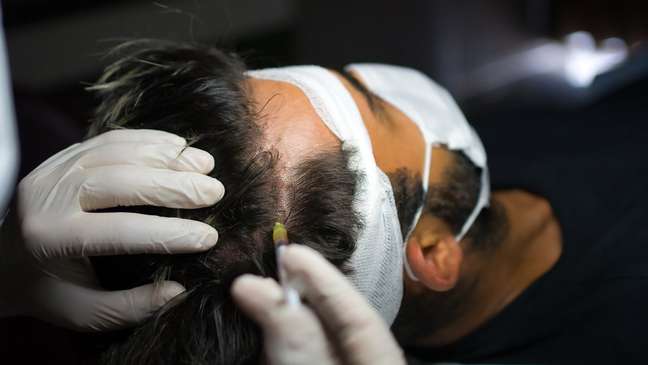One in four people infected with the coronavirus experience hair loss after their illness.
The reasons why post-covid hair loss is such a common problem are still not entirely clear, but science already highlights some possible relationships between the virus and intense shedding – a condition for which one in four is infected with Sars-CoV-2 experience.
“We know that viral infections, in general, are capable of promoting hair loss, a condition known as acute telogen effluvium,” says dermatologist Jaqueline Zmijevski, from Corumbá, Mato Grosso, a member of the SBLMC (Brazilian Society of Lasers in medicine and Surgery).
In addition to covid-19, according to the SBD (Brazilian Society of Dermatology), other conditions that can trigger telogen effluvium are fever, acute infection, sinusitis, pneumonia, flu, very restrictive diets, metabolic or infectious diseases, surgery, especially bariatric. , due to blood loss and metabolic stress, as well as emotional stress.
In the case of covid-19, when the patient realizes that the condition persists without improvement even after a period of four months from the infection, it is essential to undergo an investigation.
“What we have observed is that many patients who come to the clinic with this acute problem already have an underlying problem, such as alopecia areata or androgenetic alopecia, which previously went unnoticed,” explains Dr Fabiane Brenner, of Curitiba, coordinator of the Department of Hair and Nails at SBD.
Some scientific work indicates that the viral infection may have served as a trigger for the manifestation of other conditions, but there is not enough evidence yet, according to doctors interviewed by BBC News Brasil, to confirm the report.
Effluvium, considered the main reason for hair loss after Covid-19 infection, is self-limiting, meaning it has a predetermined duration of two to four months, if there are no other associated diseases. In theory, no treatment would be needed.
“But in practice we know that falling is very uncomfortable and causes apprehension in patients, who have the feeling of being bald. There are treatment options that can help in this acute phase triggered by covid-19 and also for those with underlying problems” , points out Vivien Yamada, a dermatologist from São Paulo, who also specializes in SBD.
diagnostic investigation
Before starting a treatment, it is necessary to know the cause of hair loss in order to better target the approach to each person.
Using a test called a trichoscope, the specialist examines the scalp through a zoom lens in a dermatoscope and checks the health of the hair follicles.
The health care practitioner may also order tests to check for levels of iron, vitamin B12, thyroid hormones, and others that could be indicative of adjacent conditions.
An important reminder left by doctors is that you shouldn’t start using any medication or therapy on your own.
“Minoxidil, a drug widely used in these cases, can cause blood pressure to drop, and is therefore contraindicated for patients with conditions such as heart or valvular failure and arrhythmia. People with these comorbidities need to be evaluated with a cardiologist “, exemplifies Brenner.
Topical and oral treatments
Minoxidil, mentioned by the SBD coordinator, is the main drug prescribed for hair loss sufferers. It works as a stimulant for the growth of new follicles, shortening the recovery time of the hair.
It can be used topically, directly on the scalp or taken in pill form.
“These are approaches that help, but even so, you need to explain the process to the patient, as in the midst of the hair loss crisis it causes anxiety. He needs to understand the cycle, knowing that improvement may not be that fast,” she says. Brenner.
Anti-inflammatory drugs and corticosteroids can also be prescribed, which fight the damage caused by viral infections, but their effectiveness depends a lot on the condition of each patient and, therefore, it is not recommended to use them without the advice of the doctor.
Another widely prescribed option is biotin, a supplement that improves hair quality. But although it can be used as a complementary treatment, doctors warn that there is no scientific evidence that the substance helps in cases of effluvium.
Exsynutriment can also be used as an “extra” treatment for general hair health, but not to be considered effective in treating effluvium. “It is a source of silicon, which ‘pulls’ the water where we have the keratin, meaning its function is to help moisturize the skin and hair,” explains Yamada.
Infringements
Microinfusion of medicines on the scalp can also be used for intense hair loss. The procedure is often used as a complement.
“We use microneedles immersed in medicines that make small holes of controlled depth, making sure that the assets are delivered in an optimized, precise and uniform way. In addition, the same needles promote an increase in local vascularization and the release of substances that activate multiplication. cellular, which also promotes hair growth “, emphasizes Zmijevski.
Intradermal therapy, also known as mesotherapy, and microneedling use the same principle.
The mixture of substances is particular for each case, but it can take anti-inflammatory drugs, minoxidil, vitamins and others.
In cases where alopecia is found, the infiltrations may contain a hormone blocker such as finestertide, which inhibits the action of the hormone acting on the condition.
While not a consensus among all doctors, specialist Jaqueline Zmijevski comments that the low-frequency laser is also an option to aid in the growth of new hair.
“It works by improving local vascularization and the consequent supply of nutrients, reduces the inflammatory process around the follicle, minimizing hair loss, dandruff, itching and flaking, as well as stimulating the mitochondria, cellular organelles responsible for supplying energy to the follicle, optimizing its production of new yarns “.
Text originally published inhttps://www.bbc.com/portuguese/geral-62383439
Source: Terra
Benjamin Smith is a fashion journalist and author at Gossipify, known for his coverage of the latest fashion trends and industry insights. He writes about clothing, shoes, accessories, and runway shows, providing in-depth analysis and unique perspectives. He’s respected for his ability to spot emerging designers and trends, and for providing practical fashion advice to readers.

